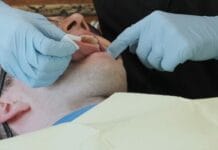New evidence suggests that a common bacterium associated with periodontal disease can cause a metabolic syndrome to develop and eventually lead to diabetes and heart disease due to its ability to alter microbiomes in the gut. Metabolic syndrome involves a variety of conditions, including obesity, high blood pressure, altered lipid metabolism, systemic inflammation, and high blood glucose levels that can lead to insulin resistance. The Federation of American Societies for Experimental Biology published the study in an article titled, “Porphyromonas gingivalis impairs glucose uptake in skeletal muscle associated with altering gut microbiota.”
The Dangers of Diabetes and Heart Disease
Diabetes develops when someone has higher than normal blood sugar levels, and their body can’t produce enough insulin to convert glucose into energy. The metabolic disorder can eventually cause serious, life-threatening diseases such as chronic kidney disease, cardiovascular heart disease, or a stroke when left untreated. The most common signs and symptoms linked to diabetes include extreme thirst, weight loss, blurred vision, fatigue, and frequent urination.
The Centers for Disease Control and Prevention (CDC) reports there are more than 100 million adults living with diabetes or prediabetes in the United States. Meanwhile, an estimated 9.3 percent of the global adult population were diagnosed with diabetes in 2019, according to Statista. That number is expected to increase to 11 percent by the year 2045, based on their projections.
Heart disease or cardiovascular disease refers to a range of conditions that can interrupt blood flow to the heart or stop it from working properly. Heart disease is the leading cause of death for adults in the United States and around the world. In fact, the CDC reports that a cardiovascular illness causes one out of every four deaths in our nation. The disease also takes an estimated 17.9 million lives each year around the globe, based on data gathered by the World Health Organization.
The Tokyo Medical and Dental University Study
A recent study conducted by researchers from the Tokyo Medical and Dental University (TMDU) revealed oral bacteria Porphyromonas gingivalis can alter the composition of the gut’s microbiome and cause skeletal muscle metabolic dysfunction. Over time, the dysfunction can alter the skeletal muscle and eventually develop into metabolic syndrome, which may increase someone’s risk of being diagnosed with heart disease and diabetes. This is partially because skeletal muscles have a high metabolic capacity due to their essential role in metabolizing glucose.
The researchers enrolled 35 Japanese patients from the Eguchi Hospital and Saga Medical School who were diagnosed with metabolic syndrome in the study. After running tests, they discovered antibodies for Porphyromonas gingivalis in their blood – thus showing a correlation between the bacterium, systemic inflammation, and the eventual development of a metabolic syndrome.
Next, the Japanese scientists performed in vivo experiments on lab mice to gather further conclusive evidence. They fed the mice a high-fat diet, so they would develop metabolic syndrome and orally administered Porphyromonas gingivalis bacteria twice per week for a duration of six weeks. At the end of the study, they used glucose tolerance and insulin tolerance tests to observe the combined effects of the animal’s poor diet and oral bacteria exposure.
The researchers examined the gut microbiome and discovered its microbial network was significantly altered due to Porphyromonas gingivalis. The rodent’s blood carried antibodies due to the oral bacteria and became systemically resistant to insulin and developed metabolic syndrome over time because of the blood glucose levels. Based on the study’s findings, the scientists believe patients who develop periodontal disease due to Porphyromonas gingivalis are at high risk for metabolic syndrome and skeletal muscle metabolic dysfunction due to changes in their gut microbiome.











